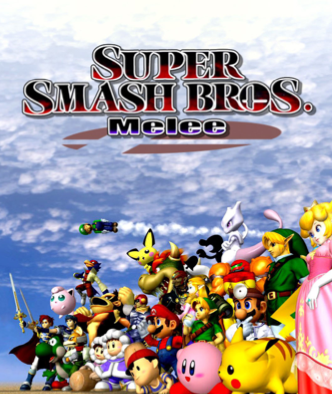“Super Smash Bros. Melee” remains a fan favorite
“Super Smash Bros.” event in Sandusky, Ohio provides missed sense of unity and fulfillment for Nintendo enthusiasts of niche Smash installment

“Super Smash Bros. Melee” was released in 2001 and perseveres as an iconic game.
September 16, 2021
The weekend of Sept. 10, I attended a “Super Smash Bros.” tournament in Sandusky, Ohio, titled Riptide. For many, “Super Smash Bros. Melee” is a fondly remembered childhood video game, released in 2001 for the Nintendo GameCube — many folks’ first home console. Others might look back on “Super Smash Bros. Brawl” as their first fighting game, which was released in 2008 for the Nintendo Wii. You may be a fan of “Smash 4” for the WiiU, or perhaps you didn’t get into Smash until its most recent version, “Ultimate”, came out in 2018. It’s possible that you might have had the original “Smash 64” game for the N64.
Regardless of which game got you into “Smash”, if you play the game — any of its versions — you know how addicting it can be and how entertaining it is to play with friends. This passion reached a new level for me when I attended a major tournament hosted for “Melee”, “Ultimate” and other fighting games.
There’s a lot of “Smash” out there, and there are a lot of players dedicated to the many iterations of the game. “Smash” holds a special place in the hearts of many, and over the years, it has gained popularity in competitive circles.
“Melee” is generally referred to as the first game in the series to become truly competitive. I began playing “Melee” in February — nearly 20 years after its release — because it is still popular in competition to this day. After becoming obsessed with this game, I decided to attend Riptide.
If you know me, you know that I’m a “Melee” elitist. I jokingly look down on other “Smash” games, claiming that “Melee” is obviously the best iteration that has ever been and ever will be released. When asked to explain why “Melee” is so special to me, I often struggle to explain why exactly the game is so unique. I’m going to attempt to put what makes “Melee” so magical into words.
“Melee” is full of nuance. At face value, the game is rather simple — a few buttons will move your character and allow them to attack the other character you are fighting against. Your goal is to send the character off-screen into oblivion, and it’s easier to do so when they have taken more damage. So, attack and hope for the best, right?
The “Melee” community has taken the game so much further than “hoping for the best,” which is the strategy a lot of casual players employ to begin the game. “Melee” players all across the world have dedicated years to understanding every quirk hidden in the game. Documentaries have been made and guides have been written about how exactly this game can be so simple, yet so intricate.
At Riptide, I was able to see incredible passion displayed in the crowds of people that turned up from all over the States. People really, really, care about “Smash”. Most of the people who attended the tournament had attended many other tournaments in years past, but this was the first major event since the pandemic. The high energy palpable throughout the venue was beautiful.
There are so many little ways in which the game “Melee” is deep — some intentional from the creators of the game — but most completely unintentional. “Melee” is a beautifully happy accident. It was intended to be a party game and wasn’t really intended to be played competitively, certainly not 20 years after its release. Nintendo, in ways that I don’t have space to get into, has made it difficult for the game to maintain its competitive streak, prompting social media movements such as the #FreeMelee movement to gain traction.
“Melee” is extremely technical, complex and fast-paced, with far fewer bells and whistles than its later iterations. I won’t get into what makes this game so technically different from other Smash games or fighting games in general, but it is hard to be good at “Melee”.
“Melee” offers an incredible skill gap, meaning the spectrum on which players exist is terrifyingly wide. (This skill gap was intentionally castrated in later games). There is also a high skill floor in “Melee”, meaning you have to work pretty hard to be able to play the game properly. In other games, the skill floor was lowered severely. For example in “Ultimate”, it’s easy to be good, though still hard to be really good.
This high-skill floor doesn’t make for the most accessible video game community — that I’ll admit. However, I’ve really come to love the “Melee” community over the few months I’ve been a part of it. The community is full of dedicated people who care deeply about the game and the people that play it.
The community isn’t perfect, but there’s a lot of healthy discourse that occurs between its members — the “Melee” community is ever-living, and, in my opinion, ever-improving.
In order to be good at “Melee” in a competitive sense, practice is essential. As such, there is a culture in the “Melee” community of hard work, consistent practice and dogged determination. The people who play the game love it because it’s brought them something — friends through tournament culture — a culture in which you drive an absurd number of miles to a tiny, cramped venue just to play the game you love with some people you barely know and many others you know all too well. It’s brought them satisfaction too. There is something about video games that brings about a unique sort of fulfillment. It’s brought them consistent passion — something to care about that, in the past 20 years, has never really died or left. Riptide embodied this passion.
“Melee” is special. If I were asked to articulate what “Melee” means to me, I’d respond by saying that “Melee” represents the sort of curiosity I wish I could carry over into the rest of my life.
It is rare that we get to be childlike and curious and care about things that don’t really matter (i.e. the things that don’t earn us money). “Melee” offers that rare chance to do such a thing — to care deeply about something just because it matters to you.













